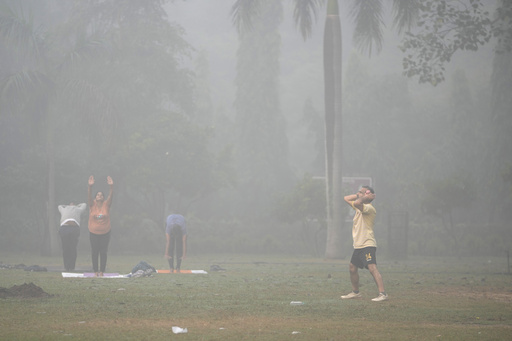
NEW DELHI — For many residents of New Delhi, a city often marked by severe pollution, Lodhi Garden serves as a refreshing retreat nestled within the heart of the bustling capital. Despite the alarming rise in pollution levels, regular visitors insist that they refuse to let smog disrupt their cherished outdoor routines.
Lodhi Garden is just one of countless parks scattered throughout the city. Devotees of this green space believe its allure stems from the harmonious blend of nature and the presence of fellow park-goers, ensuring that one never feels truly alone, even in solitude. For others, a visit holds sentimental value, as families have walked the park’s circumference for generations, turning a simple habit into a cherished tradition.
On any typical day at the park, you might encounter retired bureaucrats gathering in groups to discuss political matters, yoga enthusiasts seeking a moment of wellness, or an aspiring marathoner racing past. Young couples often sneak moments of privacy beneath the trees, while older patrons stroll hand in hand, and as weekends roll around, the lawns teem with families enjoying picnics.
However, as a toxic haze cloaked the city this month, pushing air quality into the “severe” classification, some frequent visitors began to reflect on how these conditions have altered their routines.
Rajiv Sikri, 76, and Subodh Jain, 72, have been taking morning walks in Lodhi Garden for over two decades. While acknowledging their concern over pollution, Sikri pointed out the impracticality of isolating oneself completely. “We enjoy walking, whether it’s one lap or a little more,” he remarked humorously, adding that they spend their time solving the world’s problems with lighthearted banter. Jain added, “What else can you do? Sitting at home is not an option.”
Rajiv Gupta, 54, and his wife, Manisha, 50, have mulled the idea of relocating from New Delhi, which has a population of over 33 million. Regular visitors to the park for the past 15 years, the couple noted that pollution has diminished its appeal. Gupta noted the physical toll it has taken on them, with complaints of scratchy throats and breathing difficulties. “We come to enjoy the fresh air, but it’s become a challenge to find it here,” he stated. Manisha expressed concern over the effects of pollution on their children and felt anxious about protecting them.
Bashir Ahmad Mir, 60, has incorporated Lodhi Garden into his routine for a decade, using it for his daily two-hour exercise sessions. The carpet seller, who relocated from Kashmir, shared that the pollution has started to irritate his eyes. “I have to keep cleaning them,” he shared, acknowledging the dilemma he faces, “I know it’s harmful, but where else can I go?”
Vanita Pathak, 55, who has visited the park for over 20 years, remains determined to maintain her daily visits, holding onto the hope that nature can help combat the pollution crisis. “We keep hearing about staying indoors, but I don’t believe coming here is harmful,” she expressed with optimism.
While some attendees worry about the degradation of air quality, others remain indifferent. Anita Gahtori mentioned that her in-laws have ceased their park visits since the beginning of the month, around Diwali, a festive time that typically leads to increased pollution. Concerned for their health, she remarked she would think twice about bringing her children, including her 12-year-old daughter, Sakshi.
For Ajay Chowdhary, a yoga instructor who has frequented the garden for over 30 years, the park has been integral to his physical and mental wellness. He noted that he adapts his exercise routine on particularly polluted days, opting for lighter forms of activity that require less intense breathing.
A long-time visitor spotted walking his dogs, who identified himself only as Ajay, was reflective about his 50-year association with the park. He acknowledged that while pollution is bothersome, it has become part of his habitual visit to this beloved spot.
Meanwhile, Charu Shankar commented on her son, Agastya, expressing that she had given up worrying about the pollution as it persists year after year. She continuously runs air purifiers at home and concocts her own remedies but remains especially frustrated with authorities for their lack of action. “Of course, I’m angry, but I refuse to be confined indoors,” she concluded, embodying a sentiment shared by many urban dwellers fighting to maintain a semblance of normalcy amidst an ongoing environmental crisis.
